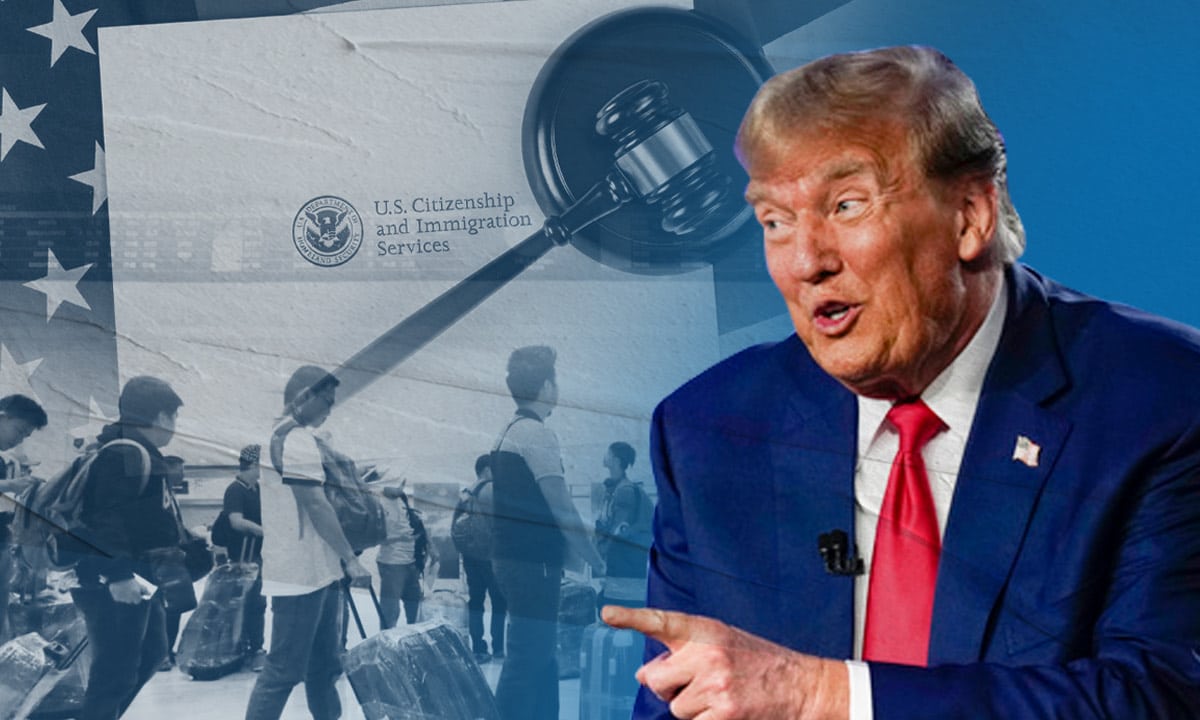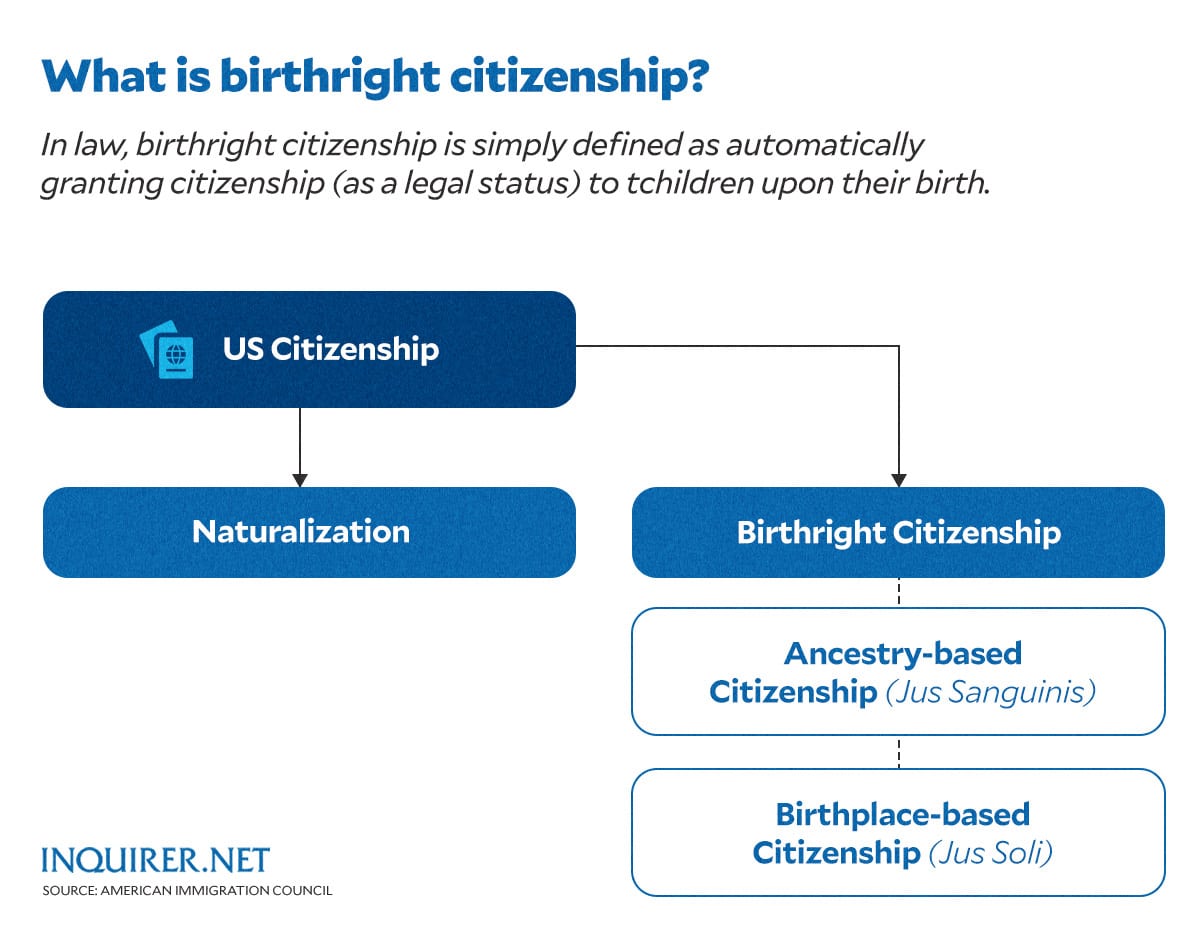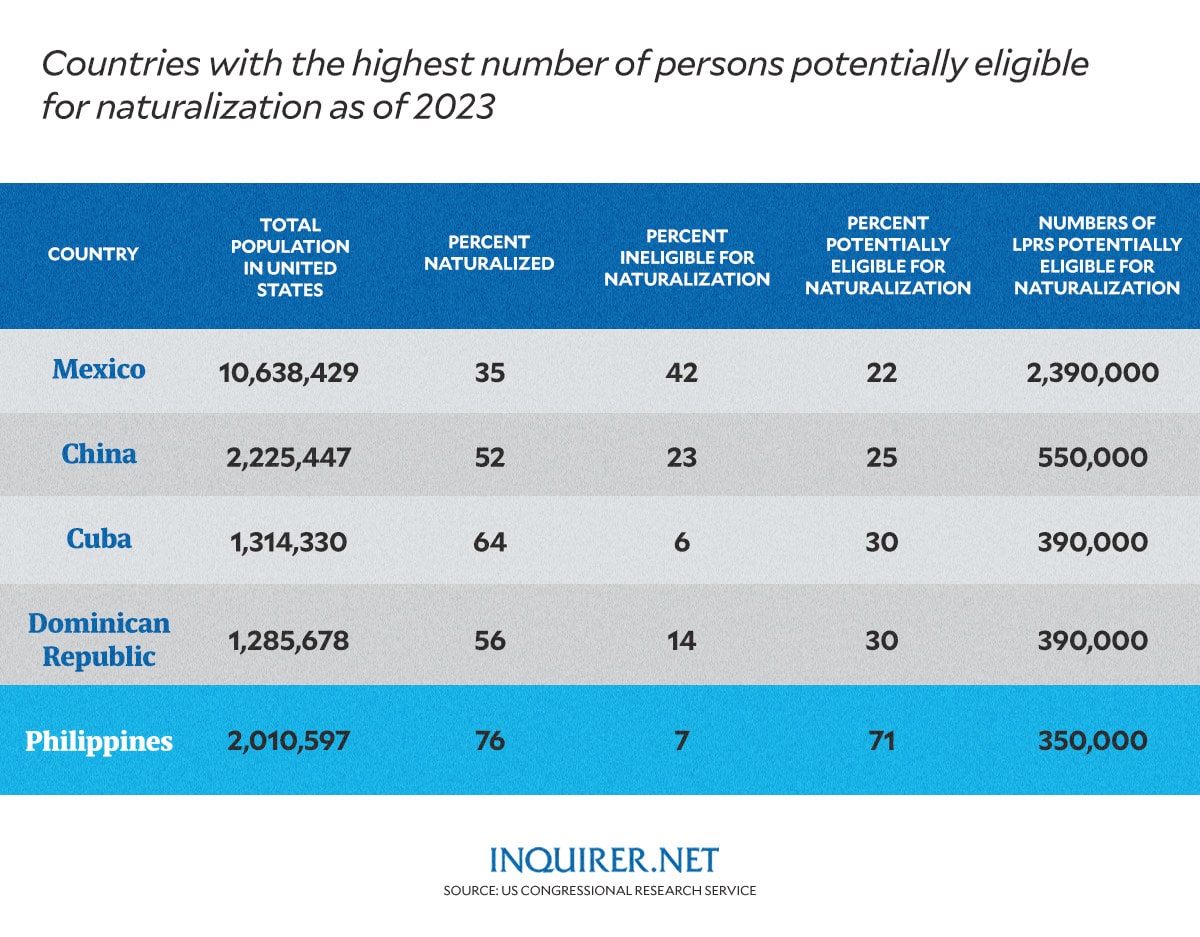Trump going berserk, targets birthright, naturalized citizens
(First of two parts)
MANILA, Philippines—US President-elect Donald Trump has doubled down on his controversial immigration agenda, reigniting plans to strip naturalized citizens of their status and proposing to end birthright citizenship. These signal a sweeping crackdown on immigrants, both undocumented and legally settled, and stoke fresh anxieties among millions, including Filipinos in the US.
Trump has pledged to implement the “largest deportation program in U.S. history” a cornerstone of his reelection campaign, with Vice President-elect JD Vance estimating the crackdown could result in up to one million removals annually.
READ: Trump’s mass deportation plan: What it means for undocumented and legal immigrants
This focus on immigration enforcement is not new; however. During Trump’s first term, his administration ramped up efforts to investigate cases of fraudulent naturalization, seeking to strip citizenship from individuals deemed to have obtained it illegally.
Article continues after this advertisementNow, after defeating Kamala Harris in the 2024 presidential election, Trump has vowed to intensify these efforts while also pursuing another contentious policy: ending birthright citizenship.
Article continues after this advertisementREAD: What’s next for Fil-Am family petitions if Trump wins?
“On day one of my new term in office, I will sign an executive order making clear to federal agencies that under the correct interpretation of the law, going forward, the children of illegal immigrants will not receive automatic US citizenship,” the president-elect said in a campaign video he released last year.
Trump first vowed to end birthright citizenship during his 2015 presidential campaign and revisited the proposal in 2018. However, despite his repeated rhetoric, he never followed through with an executive order to implement the policy.
What is birthright citizenship?
Birthright citizenship is a legal principle rooted in the 14th Amendment of the US Constitution, granting automatic citizenship to individuals born on American soil, regardless of their parents’ immigration status.
It specifically states that “all persons born or naturalized in the United States, and subject to the jurisdiction thereof, are citizens of the United States and of the state wherein they reside.”
This doctrine, known as jus soli (right of the soil), has been a defining feature of US identity and inclusivity since its ratification in 1868.
According to the American Immigration Council, the US applies a combination of:
- Unrestricted birthplace-based citizenship (Jus Soli): Automatically confers US citizenship to individuals born on American soil, regardless of their parents’ immigration status, with limited exceptions such as the children of foreign diplomats.
- Restricted ancestry-based citizenship (Jus Sanguinis): Grants US citizenship to children born outside the United States to American citizen parents, provided they meet specific statutory criteria.
“The Fourteenth Amendment has served as a cornerstone to the commitment that every child born in the United States should be protected from discrimination and a caste-like system based on the race, ethnicity, country of origin, or immigration status of their parents,” said Bruce Lesley, president of bipartisan advocacy organization First Focus on Children.
“[It] demonstrates the nation’s goal — after the Civil War — of striving to achieve fairness, inclusion, and opportunity. Over the last 156 years, it has provided millions of children every single year with a solid foundation to grow, thrive, and contribute to our society,” he added.
Why does it matter?
The 14th Amendment was specifically designed to overturn the infamous Dred Scott v. Sandford decision, denying African Americans citizenship.
Moreover, in the 1898 Supreme Court case United States v. Wong Kim Ark, the court ruled that children born in the US to foreign parents — so long as they were not foreign diplomats or occupying military forces — are US citizens under the 14th Amendment.
By ensuring that citizenship was determined by birthplace rather than ancestry, the amendment sought to eliminate racial and class hierarchies in determining who could belong to the nation.
Removing birthright citizenship would represent a dramatic reversal of this vision, replacing it with a system in which citizenship is contingent on lineage or documentation status.
“Citizenship is not merely an identity or status; it is foundational for accessing health care, nutrition, early education, housing, and much more. Creating bureaucratic obstacles risks delaying — or denying altogether — the support babies and children need at their most formative stages,” said Lesley.
“Birthright citizenship confers simple and automatic nationality without impediments, such as the need for bureaucratic paperwork, legal barriers, bureaucratic interpretations, delays, errors, or the period of limbo status awaiting a decision from some currently unidentified bureaucracy,” he added.
For millions of children born in the US to undocumented immigrants, this change would strip away their automatic claim to American citizenship. These children could become stateless, particularly if their parents’ home countries do not recognize them as citizens.
Experts explained that this lack of legal status would jeopardize access to education, health care, and other vital services, creating an underclass of individuals marginalized from the very society in which they were born and raised.
Trump’s plan
“The United States is among the only countries in the world that says even if neither parent is a citizen or even lawfully in the country, their future children are automatic citizens the moment the parents trespass onto our soil,” Trump said last year.
Under Trump’s proposed policy, a child would only be granted citizenship if at least one parent is a US citizen or legal resident. In his campaign video posted in May 2023, Trump clarified that this policy would not be applied retroactively, suggesting it would only affect children born after its potential enactment.
Trump also emphasized that the policy aims to curb “birth tourism,” a practice Republicans argue involves foreign nationals traveling to the US late in pregnancy to ensure their children are born as US citizens.
However, the scale of this phenomenon remains unclear, with limited data to support its prevalence.
The exact number of children born annually to undocumented parents is uncertain. Estimates vary, but the Center for Immigration Studies, a group advocating for stricter immigration policies, has suggested that as many as 400,000 children are born each year to undocumented parents, with thousands possibly tied to birth tourism.
In contrast, immigrant rights groups like the American Immigration Council highlight broader implications, citing census-based estimates that 3.7 million U.S.-born children currently have at least one undocumented parent.
Adding to the complexity, a 2024 report from the Center for Migration Studies estimates there are approximately 4.7 million mixed-status households in the United States.
Can Trump end birthright citizenship?
Michael LeRoy, an immigration law and labor expert at the University of Illinois Urbana-Champaign, emphasized in an interview that no president has the authority to unilaterally eliminate or alter a constitutional amendment.
Despite this, he noted that the incoming president might still attempt to issue an executive order targeting birthright citizenship, even though “such an action would be blatantly unconstitutional.”
The American Immigration Council points out that removing birthright citizenship for children born in the U.S. would require a new constitutional amendment. This process would need a two-thirds majority vote in both the House and Senate and ratification by three-quarters of the states — which the advocacy group described as an almost impossible political hurdle.
But since the US Senate and House are now Republican-dominated, Trump could have his way.
Alternatively, it would take a radical reinterpretation of the 14th Amendment by the US Supreme Court, a highly contentious and uncertain path.
“While Congress or the President could try to restrict birthplace-based birthright citizenship through legislation or executive order, these actions would violate the Fourteenth Amendment,” said the American Immigration Council.
Legal experts also agree that any such effort would be met with immediate legal challenges.
Stephen Yale-Loehr, a professor of immigration law at Cornell University, told CBS News, “Any executive action that a president might try to end birthright citizenship would be challenged in court and would be likely struck down as unconstitutional.”
Push for denaturalization
During Trump’s first term, his administration took an aggressive stance on denaturalization — the process of stripping US citizenship from naturalized individuals. Efforts were launched to investigate cases where people were suspected of gaining citizenship through fraud.
Under “Operation Janus,” immigration officials reviewed decades-old fingerprint records to find discrepancies that could signal fraud in naturalization applications. By 2018, thousands of cases had been referred for potential denaturalization, with hundreds pursued in federal courts.
The US Justice Department even created a special Denaturalization Section in 2020 to handle such cases. Officials claimed the focus was on individuals who posed national security threats, were war criminals, or had committed egregious acts of fraud.
But the move sparked concerns, with critics arguing it could sow fear in immigrant communities.
“Denaturalization is a drastic measure that should only be taken in the most extreme circumstances,” the American Civil Liberties Union (ACLU), a nonprofit civil rights organization, said.
“These efforts to strip citizenship from Americans are systemic and chilling. They have made US citizens fearful that mistakes made years ago on their past applications could be used to target them, take away their citizenship, and destroy their lives,” the organization added.
The Trump administration’s focus on denaturalization marked a significant shift in immigration enforcement policies. Historically, denaturalization cases were pursued sparingly, averaging just 11 cases per year between 1990 and 2017. However, under Trump’s leadership, these efforts intensified dramatically.
By 2018, the Department of Homeland Security (DHS) had already referred 95 cases for denaturalization to the Department of Justice (DOJ), signaling a stark departure from past practices.
What’s at stake?
Eliminating birthright citizenship could have devastating consequences for millions of children and families, creating long-term social and economic challenges.
According to a report from First Focus on Children, denying citizenship to US -born children of undocumented immigrants would leave many in legal limbo, without access to essential resources like education, health care, or housing. For children born and raised in the US, but unable to claim citizenship, this could mean being treated as outsiders in their own country.
Stripping citizenship would also create a growing population of stateless individuals who struggle to get jobs, attend college, or participate fully in society. This would deepen inequalities, increase poverty, and strain community resources.
For children, the harm isn’t just legal or financial — it’s deeply personal. Without citizenship, they might feel excluded or unwelcome in the only country they’ve ever known.
“It’s important to remember that children rely on policymakers, advocates, and citizens to protect their interests because they cannot advocate for themselves. It is morally indefensible to enact a law that deprives them of their right to belong,” the report explains.
Moreover, efforts to end birthright citizenship, coupled with the push for denaturalization, suggest that even those who meet all legal requirements or were born on US soil might not be secure in their place in the country.
A report by Vox stressed that naturalized citizens, who often spend years navigating the rigorous legal process, now fear that even small mistakes in their applications could lead to losing their status.
Critics argue that these policies create an atmosphere of fear and insecurity, making immigrants and their families feel like they’re never truly safe.
For many, this undermines the idea of America as a nation of opportunity and inclusion, raising concerns that citizenship is becoming conditional — a privilege that can be taken away rather than a right that guarantees stability and belonging.
(Next: How could Trump’s immigration agenda affect Filipinos?)
RELATED STORIES:
Trump 2.0: PH stays optimistic amid worries on aid, health care
Trump 2.0 impact on PH: Quack health advocate brings uncertainty


















